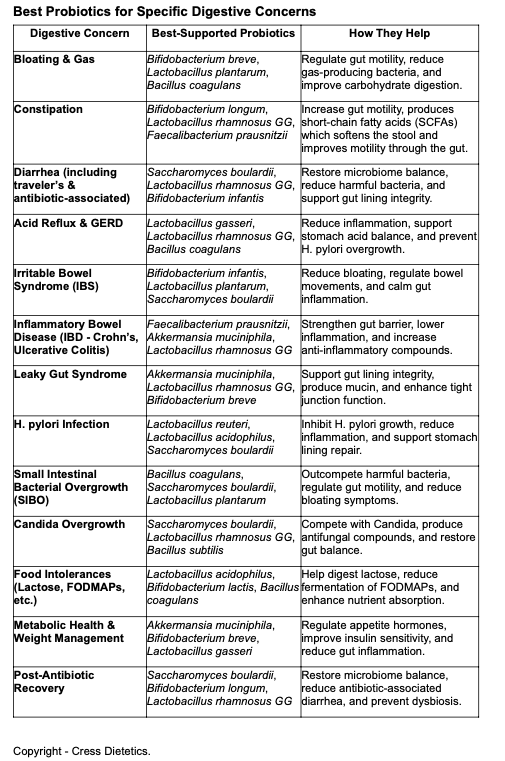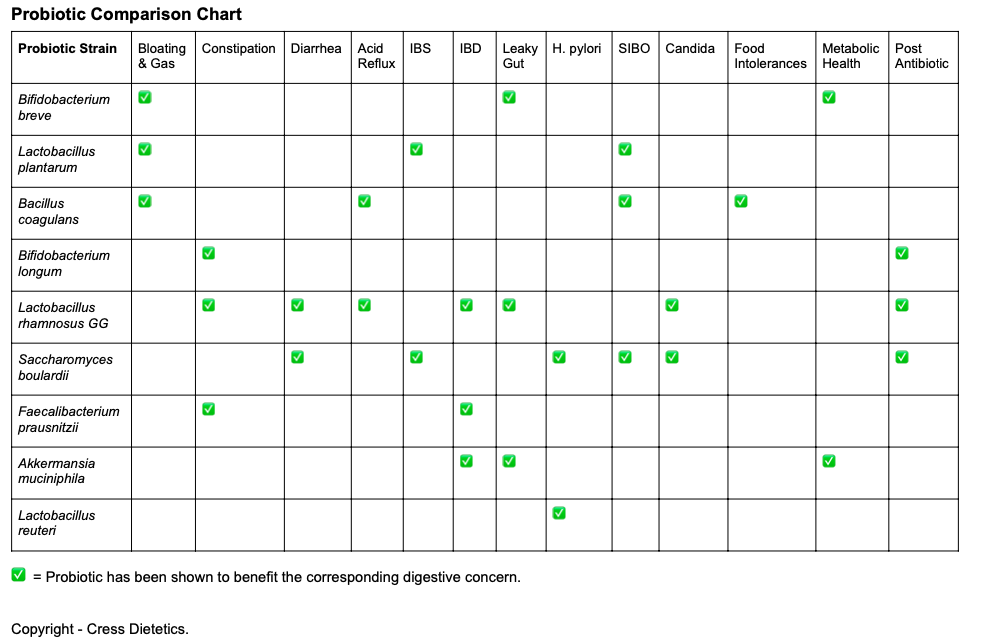Which Probiotics to take for Digestive Health
This blog outlines which probiotics should be considered to optimize gut health. It outlines the specific strains heal specific digestive concerns
Matthew Cress
3/31/20252 min read


Probiotics are living microorganisms (bacteria and yeasts mainly) that can greatly influence digestion and gut health. They help balance the microbiome, improve digestion, reduce inflammation, and even support immune function.
There are so many probiotics out there on the market that you may be wondering
Which probiotics should I take to improve my personal gut health and state of digestion?
This article outlines different probiotic strains that support digestion and provide a scientifically backed table to match probiotics to common digestive health concerns.
How Probiotics Improve Digestive Health
Probiotics work in a variety of ways to enhance gut function and overall well-being. Some key mechanisms include:
Restoring Microbial Balance: They help repopulate the gut with beneficial bacteria after disruptions (e.g., antibiotics, illness, poor diet).
Producing Digestive Enzymes & Metabolites: Some strains produce short-chain fatty acids (SCFAs) that nourish the inner lining of the gut and improve motility.
Regulating Gut Motility: Probiotics influence peristalsis, helping with issues like constipation and bloating.
Strengthening the Gut Barrier: Certain strains enhance mucin production and improve tight junction function, reducing leaky gut symptoms.
Reducing Inflammation: Many probiotics modulate immune responses and reduce gut inflammation associated with IBS, IBD, and other conditions.
Competing with Harmful Microbes: Some probiotics outcompete pathogenic bacteria and fungi, reducing infections and overgrowths.
Choosing the Right Probiotic for You
When selecting a probiotic, consider the following:
Strain-Specific Benefits: Not all probiotics function the same way. Be sure to take the correct probiotic for your individual needs.
Matt’s note: Check your nutrition and probiotic biases at the door, if you have a problem with digestion and what you’re doing isn’t working then change is necessary. The probiotics in the table above have been proven to be most effective. Before getting a new fancy probiotic try the ones that have been proven to work.Quality & Viability: Look for products with clinically validated strains and a high CFU (colony-forming unit) count. Yes, the quantity does matter, if you do not have enough microbes going in the probiotic may not be strong enough to actually make a difference.
Prebiotic Support: Many probiotics work better when paired with prebiotics (foods that the microbes in the probiotic can eat once they are in the gut.
Consistency is Key: While immediate benefit can be found when starting a probiotic some of them often require daily use for at least a few weeks to show noticeable benefits. Don’t be fickle! If you need help, contact Matt.
Final Thoughts
Probiotics play a crucial role in digestive health, but choosing the right strains is essential for getting the best results. By matching specific probiotics to your digestive concerns, you can optimize your gut microbiome and improve your overall well-being. Whether you’re dealing with bloating, constipation, acid reflux, or IBS, there’s a probiotic that can help.
If you liked this blog post, show it some love! Matt greatly appreciates it! If you're interested in personalized nutrition and gut health guidance, consider booking a consultation with Matt to optimize your diet and digestive health.
Ask questions in the comments section below if you have them.
Thanks for reading!
Featured youtube video - Research Papers, L-Reuteri, Probiotic Food Sources, Bacteria Temperature Ranges


Nutrition & Lifestyle
Holistic approach to sustainable dietary changes.
Contact
matt@cressdietetics.com
© 2025. All rights reserved.
Terms & Conditions
